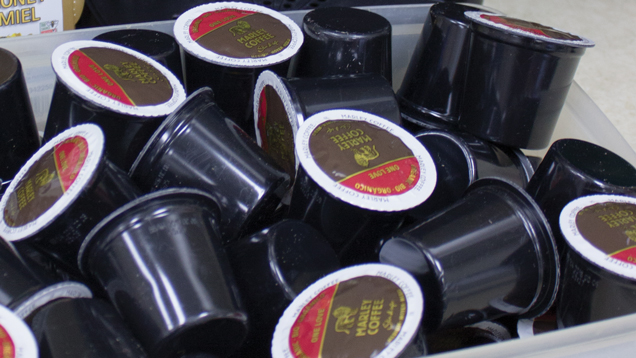Brewing trouble?
 CREDIT: KERRA SEAY
CREDIT: KERRA SEAYStudents, with their never-ending schedule, rely on coffee to get them through the day and although caffeine addiction leads to no serious long-term illnesses, excessive amounts are not good for you.
What is caffeine dependency, and when should we be concerned
Students have numerous tasks to finish throughout the day. Sometimes, we wonder how we have the energy for our classes, assignments, tests, jobs and social lives. It’s hard to think how we could possibly get through our day without that buzz from the caffeine in a cup of coffee or an energy drink.
Although caffeine wasn’t listed as one of the most commonly abused substances for young adults, some people may feel dependent on caffeine.
Dr. Ken Lee, a consultant for Canadian Mental Health Association Middlesex (CMHA Middlesex), and Addiction Services Thames Valley, defined caffeine dependency as an excessive use of the stimulant, leading to some sort of psychological or physical impairment.
He said an excessive amount of caffeine depends on the person, usually about the equivalent of five to six cups of coffee. However, experiencing withdrawal symptoms could mean you are overdoing it.
“They feel edgy, they feel really tired,” Dr. Lee said about caffeine withdrawal. “But the major symptom is they get a headache.”
Dr. Lee added those who consume caffeine excessively could feel anxious with tremoring hands and more caffeine can cause a rapid heart beat. Since people feel alert after caffeine, going without it can make them feel sluggish.
However, he said it wouldn’t lead to any major health problems.
Caffeine is relied on during essay and exam seasons, when students need to concentrate, but people use caffeine for other purposes.
Aaron Mann, a Huron University College alumnus, began using caffeine pills and energy drinks about six years ago. He said a nutritionist in his circle of friends recommended them for exercising.
Although Mann said he feels tired if he cuts out caffeine for about a day or two, he “never really felt any symptoms of withdrawal” because he was told to use caffeine pills in moderation.
“Like any substance, however, extended use leads [to] your body building an immunity,” he explained. “I would have to take two caffeine pills instead of one, simply stopping for a period of time remedied this situation.”
He doesn’t think students should worry about becoming too dependent on caffeine because it’s found in plenty of products.
“For a student to become dependent on caffeine to such a high extent would require a ton of early morning coffees to the point of an unrealistic level.”
Dr. Lee also thinks caffeine dependency isn’t too much of a concern for students, as long as it’s not an excessive amount of energy drinks, which have more caffeine than coffee.
On the other hand, he said stimulant medications to treat Attention Deficit Disorder (ADD), such as Adderall, Dexadrin and Concerta, have been a growing concern for students within the past decade. “You didn’t hear about it 20 years ago, but you hear about it now,” he said.
“Using them without a prescription, without an established diagnosis of ADD, could cause some problems,” Dr. Lee said, which includes tremors, increased agitation, anxiety and occasional development of psychosis from overuse. “People start hearing things and seeing things that aren’t really there, and getting an excessive sense of paranoia.”
He added some students will even use cocaine, hoping to do better on their exams. Dr. Lee said students should schedule their study times better instead, and avoid cramming.
Health Canada recommended no more than 400 milligrams per day of caffeine for adults, which equals out to about three small coffees.
Getting through the day without the daily grind of coffee, or other caffeinated drinks, seems impossible at times. However, the Dietitians of Canada website has some tips for cutting back on caffeine.
• Drink apple cider, along with caffeine-free herbal tea and soft drinks.
• Combine regular coffee with decaffeinated coffee.
• Pick lattes and café-au-laits instead of regular coffee.
• Brewing tea for a less amount of time than usual.














